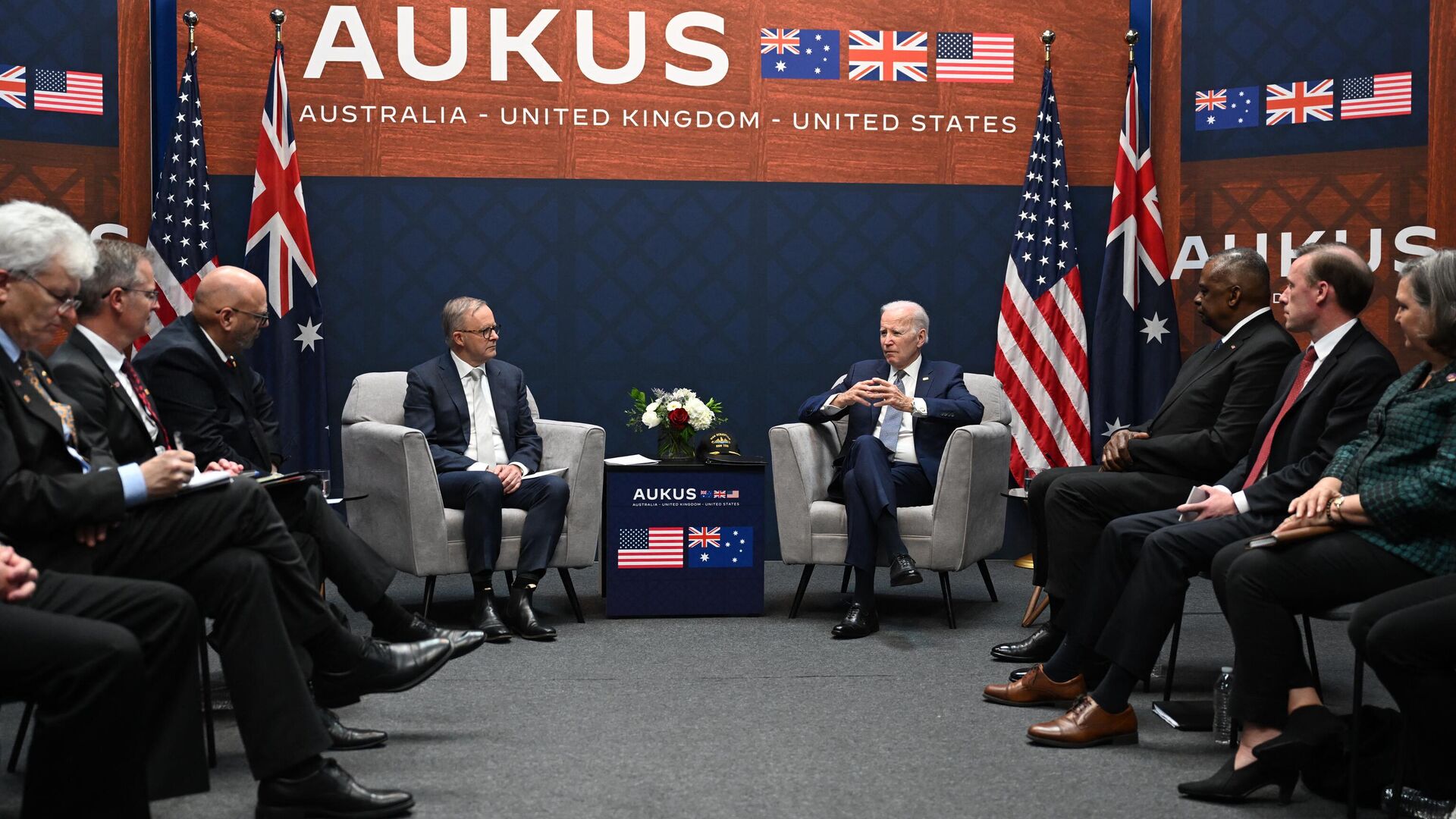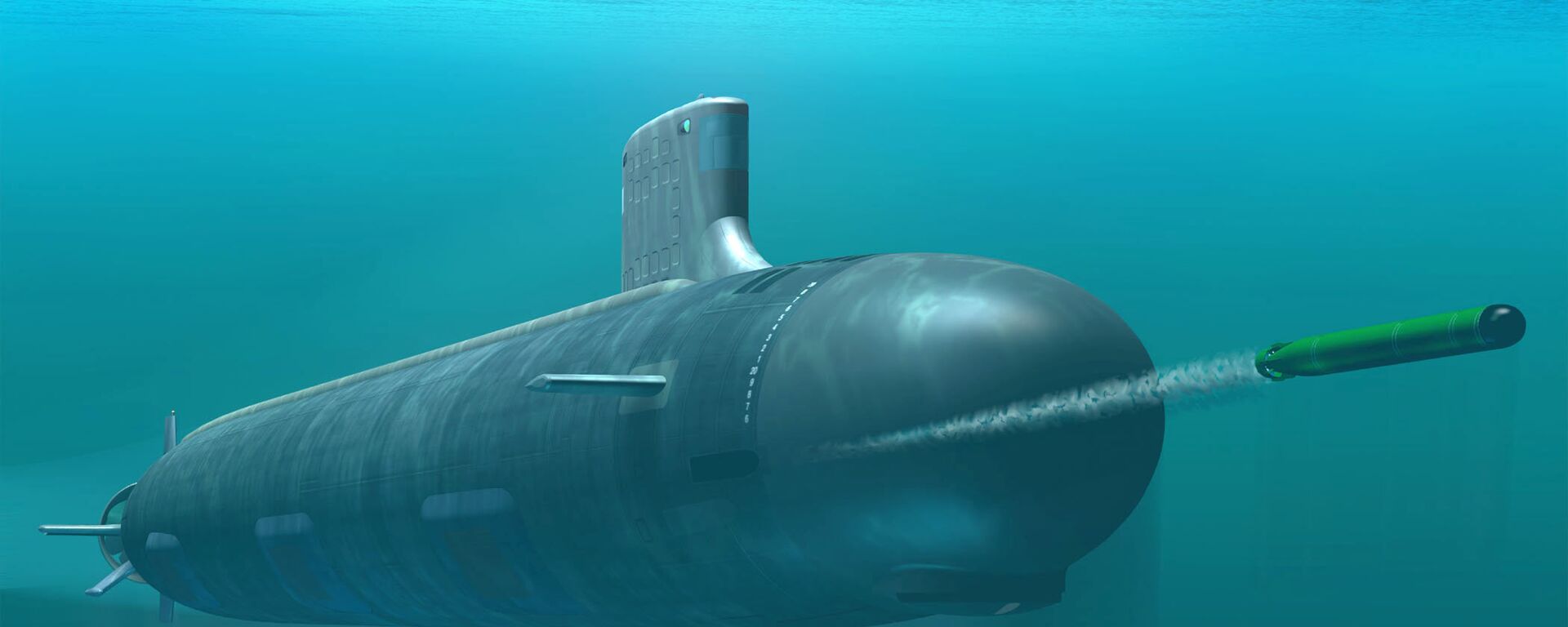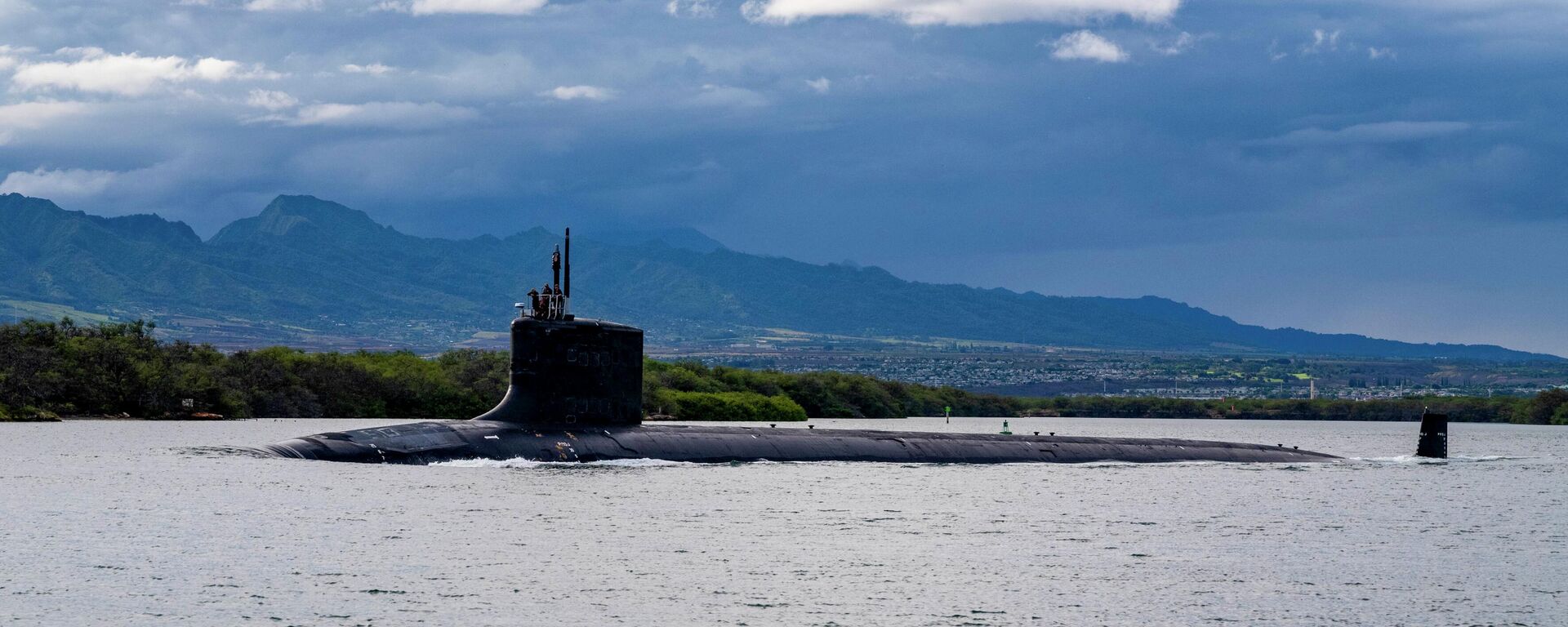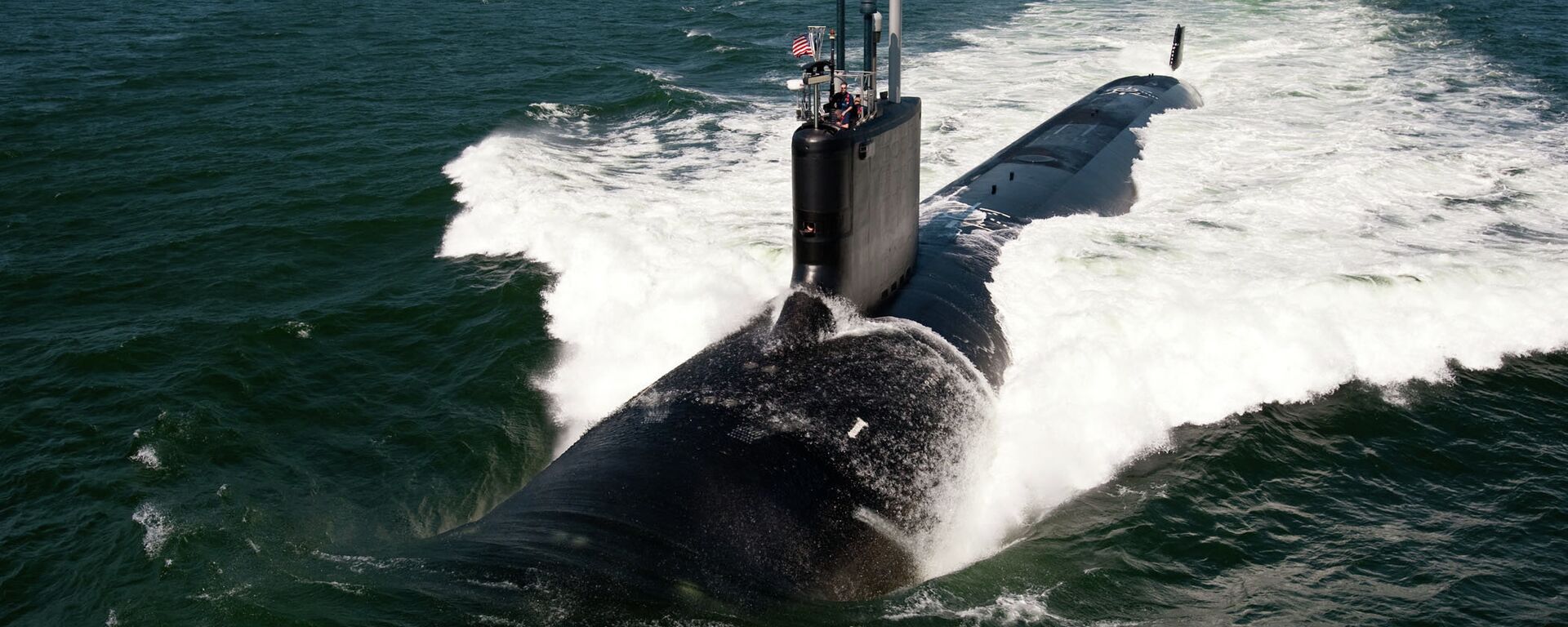https://sputnikglobe.com/20230315/aukus-dividing-asia-us-uk-australian-leaders-reveal-details-of-disputed-nuclear-submarine-deal-1108385272.html
AUKUS Dividing Asia: US, UK, Australian Leaders Reveal Details of Disputed Nuclear Submarine Deal
AUKUS Dividing Asia: US, UK, Australian Leaders Reveal Details of Disputed Nuclear Submarine Deal
Sputnik International
During a meeting in California, the US president along with the UK and Australian prime ministers have updated the key principles and features of the trilateral security pact AUKUS. The plans entail the supply of nuclear-powered submarines to Australia while cementing China's status as the perceived adversary of all three countries.
2023-03-15T10:59+0000
2023-03-15T10:59+0000
2023-05-28T15:26+0000
asia
aukus
australia
us
submarines
united kingdom (uk)
https://cdn1.img.sputnikglobe.com/img/07e7/03/0e/1108362900_0:160:3073:1888_1920x0_80_0_0_a986f06be6ccdf7afa49a11cee94f4ac.jpg
What is the Purpose of AUKUS?The last time the US, Australia and the UK united to “fight aggression in the Pacific” was more than 70 years ago, when they fought against Japan. In September 2021, these countries designated China as their main adversary in the Asia-Pacific region and began forming a military alliance against Beijing. Their trilateral security cooperation pact, AUKUS, primarily became known for its project to build nuclear-powered submarines for Australia using American and British technology.What Will Australia Pay for Its Participation in AUKUS?According to the Washington Post, the deal, worth more than $67 billion, calls for American Virginia-class submarines to be delivered to Australia starting in 2032. British submarines will arrive even later - the new SSN-AUKUS submarines will not reach Australian shores until the 2040s. Australia itself should also be given the opportunity to build SSN-AUKUS nuclear submarines based on American and British technology. In order to join AUKUS, Canberra had to break its contract with the French Naval Group for the supply of 12 Barracuda-class nuclear attack submarines worth 56 billion euros. France called Australia's decision to break the agreement a "stab in the back," but did not risk expressing its displeasure openly in front of the mastermind of the new alliance, the United States.Why Do AUKUS Plans Upset Some Australians?Australians are concerned about the impending deployment of nuclear submarines off their shores. Many Australians believe that the deal with the United States and Britain poses a potential sovereign risk to Australia, the ABC wrote. At the same time, the ports where the military nuclear submarines will be based will become a potential target for the enemy, as they will be converted from commercial to military ports, depriving many Australians of their businesses. In addition, Australia will face the question of how to control nuclear submarines. What to do with nuclear waste and the decommissioning of nuclear submarines? The authorities have been stubbornly silent on this, which only adds to the concerns of Australians, the ABC noted.Who Else in the World is Concerned About AUKUS Plans in the Region?In addition to the deceived French, who lost a lot of money, Indonesia also expressed dissatisfaction with the emergence of a new military alliance in the APAC region. As Asia News Network reported earlier, the country's foreign minister told her Australian counterpart that Canberra should make its activities in AUKUS transparent and strictly comply with the Nuclear Non-Proliferation Treaty (NPT). Otherwise, the rivalry between China and the Western powers could escalate into an open conflict that could affect all countries in the region.Russia also sees the risks of Australia having a nuclear-powered fleet. Russian Defense Minister Sergei Shoigu recalled that the United States justified its withdrawal from the INF Treaty with the need to compensate Russia and China for their efforts to develop missiles with a range allegedly prohibited by the treaty. Now Washington is insisting on stationing nuclear submarines in Australia, allegedly to compensate for China's growing naval capabilities. According to Shoigu, such actions are directly aimed at undermining the NPT and will lead to a new nuclear arms race.No wonder Beijing has criticized the trilateral pact and viewed the US-UK-Australia alliance against China as a relic of the Cold War. Chinese authorities believe that Australia's participation in AUKUS threatens the country with major problems in its relations with Beijing, which have just begun to improve after a three-year trade war, Foreign Policy wrote. Beijing also recalled that the AUKUS pact involves the exchange of information and technology between the three countries in areas ranging from intelligence and quantum technologies to hypersonic weapons, which makes the situation in the region even more explosive.According to Igor Korotchenko, editor-in-chief of National Defense magazine; director of the Center for Analysis of World Arms Trade, it is clear that the delivery of nuclear submarines to Australia is related to the confrontation with China, which has announced its intention to create "the best army in the world. It also serves as a demonstrative response to Beijing's recent personnel decisions regarding Xi Jinping's de facto unlimited tenure as president of the PRC and consequently as chairman of the PRC Central Military Commission."In fact, this is the "NATO-ization" of the Asia-Pacific region, involving other countries, including New Zealand, the expert believes. India has been cautious so far. Although it has its own conflict situations with China, it does not want to aggravate bilateral relations.The reaction of the countries of the region is irrelevant, since the decision has been made. In this case, the trilateral meeting of Biden with Rishi Sunak and Anthony Albanese is only a formal framework for the deal, the expert concluded.
https://sputnikglobe.com/20230313/australia-pukes-up-its-independence-by-purchasing-us-nuclear-submarines-says-scholar-1108352443.html
https://sputnikglobe.com/20230313/us-uk-to-rotate-nuclear-powered-submarines-into-australia-in-2027---us-official-1108356811.html
https://sputnikglobe.com/20230312/uks-sunak-heads-to-us-for-latest-phase-of-aukus-deal-amid-inflated-allegations-of-china-threat-1108308604.html
australia
united kingdom (uk)
Sputnik International
feedback@sputniknews.com
+74956456601
MIA „Rossiya Segodnya“
2023
Sputnik International
feedback@sputniknews.com
+74956456601
MIA „Rossiya Segodnya“
News
en_EN
Sputnik International
feedback@sputniknews.com
+74956456601
MIA „Rossiya Segodnya“
Sputnik International
feedback@sputniknews.com
+74956456601
MIA „Rossiya Segodnya“
aukus, military bloc, us, uk, australia, nato-ization of asis pacific
aukus, military bloc, us, uk, australia, nato-ization of asis pacific
AUKUS Dividing Asia: US, UK, Australian Leaders Reveal Details of Disputed Nuclear Submarine Deal
10:59 GMT 15.03.2023 (Updated: 15:26 GMT 28.05.2023) During a meeting in California, the US president along with the UK and Australian prime ministers have updated the key principles and features of the trilateral security pact AUKUS. The plans entail the supply of nuclear-powered submarines to Australia while cementing China's status as the perceived adversary of all three countries.
What is the Purpose of AUKUS?
The last time the US, Australia and the UK united to “fight aggression in the Pacific” was more than 70 years ago, when they fought against Japan. In September 2021, these countries designated China as their main adversary in the Asia-Pacific region and began forming a military alliance against Beijing. Their trilateral security cooperation pact, AUKUS, primarily became known for its project
to build nuclear-powered submarines for Australia using American and British technology.
What Will Australia Pay for Its Participation in AUKUS?
According to the Washington Post, the deal, worth more than $67 billion, calls for American Virginia-class submarines to be delivered to Australia starting in 2032. British submarines will arrive even later - the new SSN-AUKUS submarines will not reach Australian shores until the 2040s. Australia itself should also be given the opportunity to build SSN-AUKUS nuclear submarines based on American and British technology. In order to join AUKUS, Canberra had to break its contract with the French Naval Group for the supply of 12 Barracuda-class nuclear attack submarines worth 56 billion euros. France called Australia's decision to break the agreement a "stab in the back," but did not risk expressing its displeasure openly in front of the mastermind of the new alliance, the United States.
Why Do AUKUS Plans Upset Some Australians?
Australians are concerned about the impending deployment of nuclear submarines off their shores. Many Australians believe that the deal with the United States and Britain poses a
potential sovereign risk to Australia, the ABC wrote. At the same time, the ports where the military nuclear submarines will be based will become a potential target for the enemy, as they will be converted from commercial to military ports, depriving many Australians of their businesses. In addition, Australia will face the question of how to control nuclear submarines. What to do with nuclear waste and the decommissioning of nuclear submarines? The authorities have been stubbornly silent on this, which only adds to the concerns of Australians, the ABC noted.
Who Else in the World is Concerned About AUKUS Plans in the Region?
In addition to the deceived French, who lost a lot of money, Indonesia also expressed dissatisfaction with the emergence of a new military alliance in the APAC region.
As Asia News Network reported earlier, the country's foreign minister told her Australian counterpart that Canberra should make its activities in AUKUS transparent and strictly comply with the Nuclear Non-Proliferation Treaty (NPT). Otherwise, the rivalry between China and the Western powers could escalate into an open conflict that could affect all countries in the region.
Russia also sees the risks of Australia having a nuclear-powered fleet. Russian Defense Minister Sergei Shoigu recalled that the United States justified its withdrawal from the INF Treaty with the need to compensate Russia and China for their efforts to develop missiles with a range allegedly prohibited by the treaty. Now Washington is insisting on stationing nuclear submarines in Australia, allegedly to compensate for China's growing naval capabilities. According to Shoigu, such actions are directly aimed at undermining the NPT and will lead to a new nuclear arms race.
“In the global dimension, the emergence of a nuclear fleet in Australia will give other states an excuse to start developing similar weapons. This will open Pandora's Box, and the global nuclear arms race will resume,” the Russian defense minister stressed.
No wonder Beijing has criticized the trilateral pact and viewed the US-UK-Australia alliance against China as a relic of the Cold War. Chinese authorities believe that Australia's participation in AUKUS threatens the country with major problems in its relations with Beijing, which have just begun to improve after a three-year trade war,
Foreign Policy wrote. Beijing also recalled that the AUKUS pact involves the exchange of information and technology between the three countries in areas ranging from intelligence and quantum technologies to hypersonic weapons, which makes the situation in the region even more explosive.
According to Igor Korotchenko, editor-in-chief of National Defense magazine; director of the Center for Analysis of World Arms Trade, it is clear that the delivery of nuclear submarines to Australia is related to the confrontation with China, which has announced its intention to create "the best army in the world. It also serves as a demonstrative response to Beijing's recent personnel decisions regarding Xi Jinping's de facto unlimited tenure as president of the PRC and consequently as chairman of the PRC Central Military Commission."
“Australia thus becomes an important partner of the United States and the United Kingdom in the APAC region, along with South Korea and Japan. In other words, these are the first steps towards the creation of a full-fledged nuclear submarine fleet adapted for military operations against China,” he said.
In fact, this is the "NATO-ization" of the Asia-Pacific region, involving other countries, including New Zealand, the expert believes. India has been cautious so far. Although it has its own conflict situations with China, it does not want to aggravate bilateral relations.
“It is still hard to say whether this will increase tensions in the region, because it will not happen before the 2030s. And we are not talking about nuclear weapons, we are talking about nuclear propulsion systems. This is precisely why Australia broke its contract with France in 2021, because it was related to conventional submarines. And Canberra believes it needs more advanced submarines as it shares the Western Pacific with China's ever-growing fleet. Nuclear-powered submarines will give the Australian Navy much more strategic power because they can stay at sea for months at a time. Australia will also be involved in radio-electronic surveillance of the Chinese fleet. In other words, it is not just about submarines, but about a systemic confrontation with China.”
The reaction of the countries of the region is irrelevant, since the decision has been made. In this case, the trilateral meeting of Biden with Rishi Sunak and Anthony Albanese is only a formal framework for the deal, the expert concluded.





